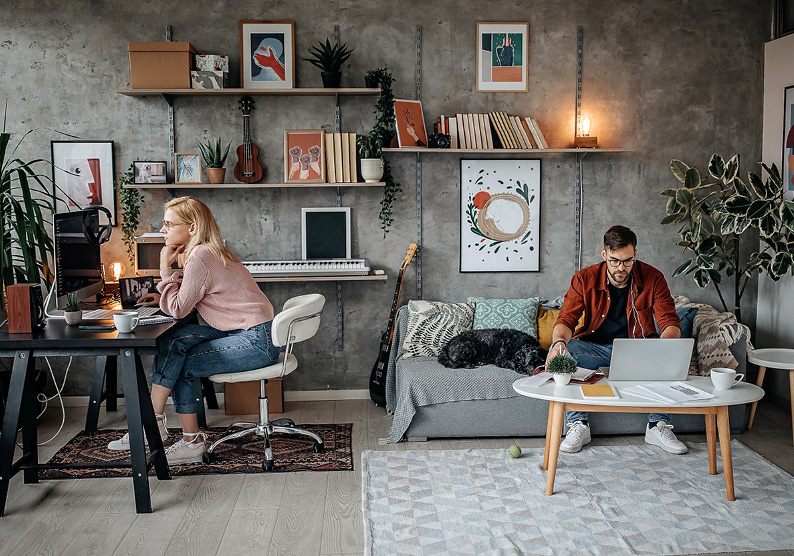I fully expected this to be a temporary shift [to working from home] … it took about another year to realise this is my new normal. My work is improved because I’m healthier and less stressed. When you free up time, you free up space in your life for other things, and that makes you a better person and a better lawyer.
Flexibility is now an absolute expectation in job descriptions, not a value-add. A problem for those hiring talent and in senior positions is that work flexibility is a lot like physical flexibility: it looks very different depending on who you ask.
COVID in Australia has not been a universal experience. Representatives of firms who attended the mid-tier law leaders roundtable also reported differences with their employees in Sydney and Brisbane a lot keener to come back than those in Melbourne offices, who faced longer lockdowns, and often fiercer outbreaks – and in time both became more used to being entirely at home. The Victorian experience also manifested in greater fear for exposing themselves, or their teammates, to the virus in the office or on public transport.
Executives and lawyers who speak to the Journal, as well as those who attended the Law Society roundtable discussions, agree that no-one appears to have gotten the balance between employee expectation and organisational need exactly right. However, querying about working from home for at least part of the week is almost always the first question asked at a job interview. “Most organisations have returned to some form of office working. But most of them are actually struggling with working out how to mandate it: do we do two days? Do we do three days? Do we create hubs? Do we ensure that specific teams have time together?” Business leader Peter Harmer says.
“How do you ensure that that there’s at least a time in the working week when every member of the team is in the office together? A number of people have actually moved geographically – into the regions, for example – in expectation that they wouldn’t have to return to the office. And now most companies are really struggling with what that hybrid model looks like. For law firm leaders the question is this: how do we ensure we get what we need as a business in terms of growth, development, learning, collaboration, innovation, but at the same time, we don’t impinge upon the benefits that employees have really come to expect?
 Jennifer Croker, Family lawyer
Jennifer Croker, Family lawyer
“Most companies are feeling their way to the answer, and they’re involving their employees in that conversation. I do feel companies are starting to become a little bit firmer about what their needs and the company’s needs are, and expecting employees to understand that and not be dogmatic in their rejection of returning to the office. If you sat down 1,000 employees and said, ‘Do you want to return to the office?’, you might have 700 of them say ‘yes’ but you won’t have 700 of them say ‘I want to be in the office five days a week’. I don’t know that anyone’s got the right answer yet in terms of this balance between home and at work. But what I am sensing is that there are a lot of sensible conversations taking place, and I think the answer will look different for every organisation.”
When the Journal contacts family lawyer Jennifer Croker to ask about her move to a permanent home office, amidst the lunchtime text message exchange is a photo of her pet cavoodle. “This is what the profession looks like post-COVID,” Croker, the Principal Lawyer at Croker Edwards and the President of the Eastern Suburbs Law Society, texts with a smiley face emoji.
Croker moved her practice to her home office permanently in February 2021 after almost a year of remote working. “My view was that we had a civic responsibility to stay put. That weekend, I parked out the front of my office in the city and loaded files into my car – not knowing when I would be back,” she says.
“For the rest of 2020, I attended my office only when required – for court, mediations, things like that. Over the Christmas break that year, I decided to terminate my office lease, given how little I was using it, and switch to being a virtual member of my floor … so I would still be able to use meeting rooms.”
Like all emergency changes made due to the pandemic, the decision on whether to keep such arrangements in place has to be assessed now on how it impacts those who need a lawyer and access to justice, not only members of the profession.

“It has been important to me to make sure clients are not negatively impacted,” Croker says.
“It’s the clients’ choice whether they want to meet with me in person or electronically and most elect a video call. What used to be a day or half day off work for clients, and the same for their support person, can now be achieved in a lunch break by finding a quiet corner.
“It makes so much sense, but we really didn’t turn our minds to it before COVID.”
Croker says she has been approached by other lawyers keen to learn about the full-time transition to home working. “I fully expected this to be a temporary shift. I cleaned out ‘that’ room in my home (the one full of archive boxes and relics from travels) and, with a tape measure and Tetris skills, relocated the furniture from my office into what would become my new office at home. I’d say it took about another year after that for me to realise this is my new normal, and there’s no reason for it to not be,” she says.
“I have a free flow of information with colleagues about the serviced offices we use for meeting with clients, how to keep employees engaged, the pros and cons of various software, and puppy training tips – working with a puppy sleeping at my feet is pretty great.
“Aside from that, it’s reclaiming time. Which, at the core of it, is reclaiming life. It’s extraordinary how much time and energy goes into transporting yourself (both physically and mentally) into a bustling office environment.
“It’s like through COVID we’ve found a bit of a loop hole – freed up some time without compromising work.
“My work is improved because I’m healthier and less stressed. When you free up time, you free up space in your life for other things, and that makes you a better person and a better lawyer.”
The Law Society’s post-COVID summary found “the potential for better work/life balance, created by greater acceptance of flexible working conditions, was a further perceived positive of the COVID-related changes.”




